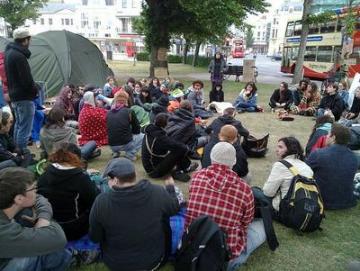The occupations and demonstrations that have rocked Spain in opposition to austerity, unemployment and party politics have reached Brighton. At least 30 people, mostly from Spain, were occupying part of the Old Steine in Brighton city centre tonight in solidarity with the movement in Spain. An assembly run on directly democratic lines, with a megaphone being passed around participants, discussed tactics and goals of the camp, with decisions made to stage further protests and put on a programme of workshops. The assembly also reiterated its independence from all political ideologies and parties. Below is some information on the English protest law we've compiled (this was a big topic of debate tonight) in English and español. A statement on the movement by our Spanish sister-section the CNT is available here.
Information about the law and protest in England
The European Convention of Human Rights, via the Human Rights Act (1998) guarantees the rights to freedom of expression (Art. 10) and freedom of association and assembly (Art. 11). This means all other laws (including those below) have to comply with these rights, subject to limits “necessary in a democratic society”. But in practice, the police will use several laws against protest. These are the most common laws they use: it is not comprehensive. For more information see http://greenandblackcross.org/legal/keyadvice
The Public Order Act (1986)
Section 12 (processions) and Section 14 (assemblies) allow the police to impose conditions (duration, route, location) on demonstrations “to prevent serious public disorder, serious criminal damage or serious disruption to the life of the community”. Breaking these restrictions can lead to arrest. Section 5 allows arrest for behaviour likely to cause “harassment, alarm or distress”.
Breach of the peace
The police have the power to arrest people 'to prevent a breach of the peace', what this means is at their discretion!
Private property
Some 'public space' (like Churchill Square) is private property. The owners (or their agents: security/management) can use reasonable force to remove you, and the police will normally assist. It is only a crime (aggravated trespass) if you trespass with “the intention of disrupting, or intimidating those taking part in, lawful activity”.
Stop and search
When you are stopped or searched under any search powers, you DO NOT have to give the police your name and address.
Remember: the police can always find a law to use if they want to stop a protest. But it's up to protesters to decide whether to ignore the police or comply. It is often a question of numbers: if there are lots of protesters it is easier to protest freely. If there are few, it is harder to ignore police instructions.
Información sobre la Ley y la Protesta en Inglaterra
La Convención Europea de los Derechos Humanos, mediante la Ley de los Derechos Humanos (1998), garantiza los derechos de Libertad de Expresión (Pro. 10) y de Libertad de Asociación y Reunión (Pro. 11). Eso significa que todas las demás leyes (ver debajo) tienen que cumplir con estos derechos que están sujetos a los límites “necesarios en una sociedad democrática”. Pero en la práctica, la policía puede utilizar algunas leyes contra los manifestaciones. Estas son las leyes que utilizan con mayor frecuencia (no es una lista completa). Para más información (en inglés) ver http://greenandblackcross.org/legal/keyadvice
La Ley de Orden Publico (The Public Order Act 1986)
La Sección 12 (desfiles) y la Sección 14 (asambleas) permiten a la policía imponer condiciones (duración, recorrido, localización) a las manifestaciones “para evitar a graves desórdenes públicos, grandes daños delictivos, o grandes perturbaciones a la vida de la comunidad”. Los actos contra estas limitaciones pueden motivar la detención. Sección 5: Se permite detener por “comportamiento que pueda provocar acoso, alarma o angustia”.
"Violación de la paz" (breach of the peace)
La policía tiene el poder para detener gente "para evitar una violación de la paz". ¡Lo que significa que pueden detener a discrección!
La propiedad privada
Algunos "espacios publicos" (como la Churchill Square) son propiedad privada. Los propietarios (o sus agentes: tanto los guardias de seguridad como la gerencia) pueden utilizar una "fuerza razonable" para sacarte, y la policía normalmente los ayudará. Sólo es delito (si entras sin autorización en propiedad ajena es más grave - aggravated trespass) si entras sin autorización con 'la intención de perturbar o intimidar a los participantes en una actividad legal'.
Detención y registro (stop and search)
Si eres detenido o registrado bajo las medidas de registrao, NO TIENES por qué dar a la policía ni tu nombre ni tu dirección.
Recordar: la policia siempre puede encontrar una ley si desean impedir una manifestación. Pero es elección de los manifestantes el decidir hacer caso omiso de la policía o cumplir con su voluntad. Muchas veces, es cuestión de número: si hay muchos manifestantes, es más facil manifestarse con libertad. Si hay pocos, es más dificil de ignorar las instrucciónes de la policia.
